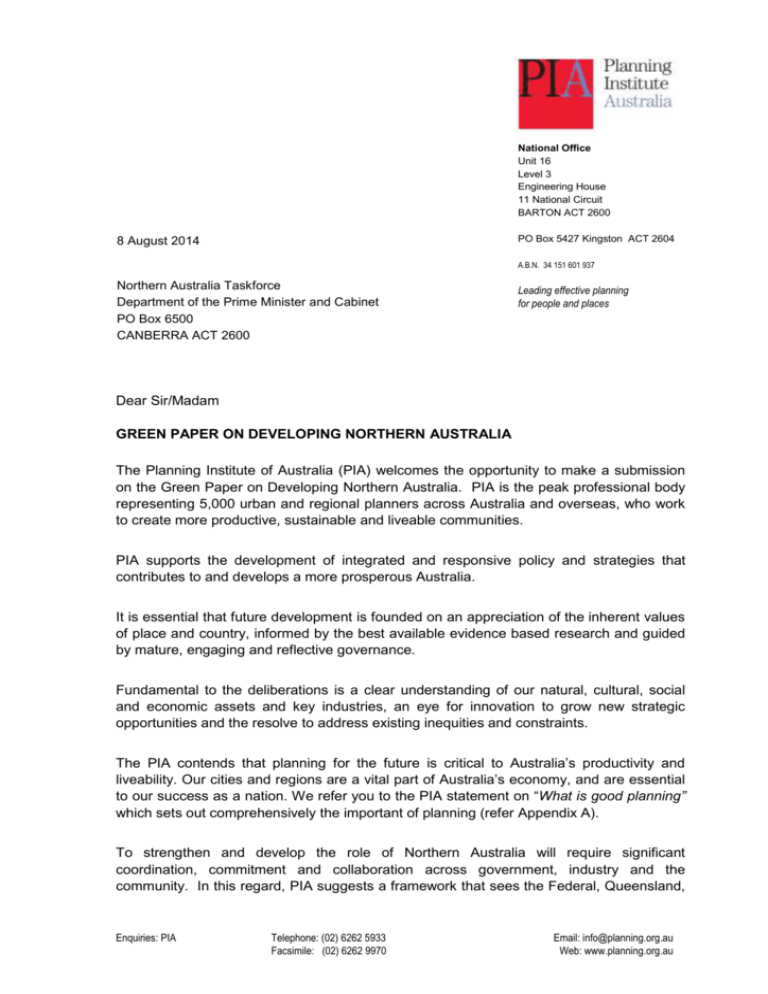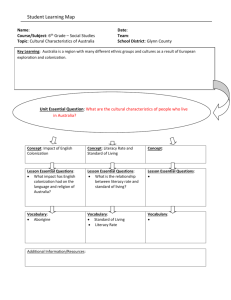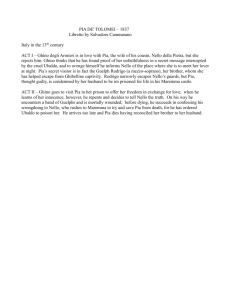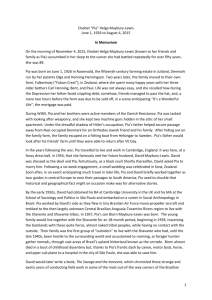DOCX - Department of Industry website
advertisement

National Office Unit 16 Level 3 Engineering House 11 National Circuit BARTON ACT 2600 PO Box 5427 Kingston ACT 2604 8 August 2014 A.B.N. 34 151 601 937 Northern Australia Taskforce Department of the Prime Minister and Cabinet PO Box 6500 CANBERRA ACT 2600 Leading effective planning for people and places Dear Sir/Madam GREEN PAPER ON DEVELOPING NORTHERN AUSTRALIA The Planning Institute of Australia (PIA) welcomes the opportunity to make a submission on the Green Paper on Developing Northern Australia. PIA is the peak professional body representing 5,000 urban and regional planners across Australia and overseas, who work to create more productive, sustainable and liveable communities. PIA supports the development of integrated and responsive policy and strategies that contributes to and develops a more prosperous Australia. It is essential that future development is founded on an appreciation of the inherent values of place and country, informed by the best available evidence based research and guided by mature, engaging and reflective governance. Fundamental to the deliberations is a clear understanding of our natural, cultural, social and economic assets and key industries, an eye for innovation to grow new strategic opportunities and the resolve to address existing inequities and constraints. The PIA contends that planning for the future is critical to Australia’s productivity and liveability. Our cities and regions are a vital part of Australia’s economy, and are essential to our success as a nation. We refer you to the PIA statement on “What is good planning” which sets out comprehensively the important of planning (refer Appendix A). To strengthen and develop the role of Northern Australia will require significant coordination, commitment and collaboration across government, industry and the community. In this regard, PIA suggests a framework that sees the Federal, Queensland, Enquiries: PIA Telephone: (02) 6262 5933 Facsimile: (02) 6262 9970 Email: info@planning.org.au Web: www.planning.org.au Western Australian, Northern Territory Governments and relevant Local Governments come together to better understand and use urban and regional planning practice to improve development outcomes, coordinate infrastructure, manage resources, protect the environment, improve quality of life, and enhance productivity needs to be established. Without this clear leadership, direction and vision the future of Northern Australia will not be supported by a true and effective governance framework that will provide the necessary platform to deliver policy that drives real action and change. PIA has adopted a set of Planning Systems Principles to guide the planning activities of the planning profession, which address the purpose of planning: Improve urban form, legibility and coherence to balance and achieve social, economic and environmental outcomes. Foster efficient and effective settlement patterns to promote prosperity, equitable distribution of resources and opportunities. Predict, avoid and ameliorate the adverse economic, social and environmental consequences of human activities, promote intergenerational equity, prudent use of non-renewable resources, the sustainable use of renewable resources, and the precautionary principle. Reflect our distinctive national character and nurture vibrant communities and contribute to our knowledge of ourselves and our built and natural environments. The adoption of a consistent set of Planning System Principles across each jurisdiction (refer Appendix B) would facilitate a more cohesive approach to the development of Northern Australia. The importance of liveable regional cities as growth and service centres is recognised within the Green Paper, and it is pleasing to see the importance of planning recognised so liveability is not compromised by rapid growth, particularly transport infrastructure. This however, will require a level of master-planning and inter-government collaboration that should not be taken for granted, and will require specific funding and access to professional services that are not always readily available in regional centres. Effective engagement with relevant professional bodies (such as the Planning Institute of Australia) could assist timely, affordable and complimentary inter-regional service provision. In addition, liaison between these bodies, government, and regional tertiary institutions could assist in meeting forward demand, whilst developing the professional networks conducive to long-term regional careers and improving inter-regional knowledge and experience sharing. Fly-in/fly-out workforce impacts are recognised as the subject of extensive community discussion (and research), but occurs for sound economic reasons that will not change through government policy, but could (in some areas) through an increasing and skilled regional population with local community aspirations and values supported by policy and regulatory settings. Other key issues that will need to be addressed include: Housing quality and availability; Key worker accommodation; Aged care housing; Tourist accommodation; Access to health services; Retention of population due to lack of services and amenity. www.planning.org.au 2 These issues will need to be addressed in order to retain families, attract new population growth and support growth and investment in the key centres. Also, community aspirations need to include all demographics: the families that are attracted to the lifestyle, challenges and adventure in the north will also need to be throughout their life. Otherwise, the north could become a place for the fit and able, and those who can’t afford to leave. The contemporary boom in mining and energy developments is creating much-needed infrastructure, but government should ensure this infrastructure is robust, capable of servicing additional industry and community uses, and accommodate and compliment future development. This is particularly true for transport infrastructure, as the north is currently particularly dependent on road freight, and any improvement and alignment of alternative rail and sea options is generally beyond the capacity of individual regions and industries. The impact of high insurance premiums on residents and industry is recognised, as is the impact of cyclones as a causal factor. However, recent cyclones clearly demonstrate that current (mandatory) building codes are more than adequate, whilst better weather forecasting ensures residents have sufficient time to prepare for cyclone events. Northern communities can therefore be more confident of surviving cyclones than southern communities faced with bushfire or floods, but this has not prevented unaffordable escalation of insurance premiums. The low number of northern residents and resultant reduced business competition could be a factor. Whilst government should not be expected to subsidise cover, insurance affordability in the north does need to be addressed as a priority. The impact of high insurance premiums on residents and industry is recognised, as is the impact of severe weather events (such as cyclones) as a causal factor. Nationally, recent severe weather events clearly demonstrate that current (mandatory) building codes are more than adequate, whilst better weather forecasting ensures residents have sufficient time to prepare for events. Northern communities can therefore be more confident of surviving severe weather events, but this has not prevented unaffordable escalation of insurance premiums. The low number of northern residents and resultant reduced business competition could be a factor. Whilst government should not be expected to subsidise cover, insurance affordability in the north does need to be addressed as a priority. A one-stop-shop for environmental approvals is proposed, with federal accreditation of state environmental processes. The paper also specifically mentions issues of governance, particularly the difficulties some communities face in developing and maintaining the human, financial and institutional capacity to provide services and support economic developments. However, the paper fails to connect these issues with the services currently being provided by regional NRM bodies throughout northern Australia, and particularly the productive relationships that have been established between these bodies and agricultural industries. www.planning.org.au 3 A significant concern of many Australians is that northern development will repeat the environmental damage popularly associated with past attempts, which lends weight to adoption of the precautionary principle and imposition of limits on development. NRM bodies demonstrated success in working with agricultural industry bodies to improve awareness and adoption of better farm management practices provides real-world assurance against repeating past mistakes. Northern Australia is also home to a significant proportion of Australia’s indigenous population, with strong ties to land and a range of issues regarding land tenure. The rights of indigenous peoples in relation to land needs to be more carefully considered, with the development of Northern Australia presenting both enormous opportunities and challenges to the wellbeing of the indigenous population and culture. We draw your attention to the CSIRO paper Land Tenure in Northern Australia: Opportunities and challenges for investment. Again, we thank you for the opportunity to comment on the Green Paper. PIA has active executive committees within Queensland, Western Australia and Northern Territory and our elected members would be willing to collectively provide any ongoing support, direction and input that the taskforce may require. Please do not hesitate to contact PIA Executive Officer (WA) Emma de Jager xxxxxxxxxxxxxxxxxx Yours faithfully, Signature removed Dyan Currie MPIA CPP National President Appendix A - What is good planning position statement refer to http://www.planning.org.au/policy/what-is-good-planning-0913 Appendix B - Planning System Principles position statement refer to http://www.planning.org.au/policy/planning-systems-principles-0713 www.planning.org.au 4









